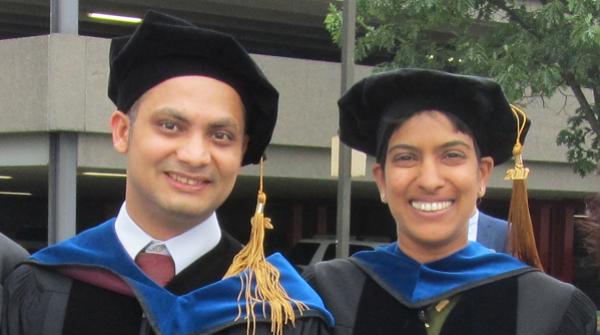 Sagar Kathuria (left) quit smoking with help from the Tobacco-Free Initiative, and his wife Madhavi Kolli is glad he did. Both Kathuria and Kolli graduated from the GSBS in 2010, and are now postdoctoral fellows in the Department of Biochemistry & Molecular Pharmacology |
Sagar Kathuria, PhD, smoked his last cigarette on May 21, 2008—six days before all buildings and grounds at UMass Medical School and UMass Memorial Medical Center became tobacco-free. This week marks the third anniversary of the Tobacco Free Initiative, undertaken jointly by UMMS and UMass Memorial to promote health and reduce the risks of exposure to second-hand smoke among all who work, study and receive medical treatment at their facilities. It also marks three years of living nicotine free for Dr. Kathuria.
During the six months of institutional preparation leading up to the tobacco ban, he was one of hundreds of UMMS and UMass Memorial employees, faculty, students and volunteers who took advantage of smoking cessation services made available during the transition. A range of resources to encourage and support efforts to quit, including low- and no-cost medications, individual and group counseling, proved integral to the initiative’s success.
“The counseling sessions, the other members of the group and the free nicotine lozenges helped me quit a 20-year habit,” said Kathuria. Now a post-doctoral fellow in the Department of Biochemistry & Molecular Pharmacology, Kathuria was a student in the Graduate School of Biomedical Sciences when the impending smoking ban was announced on Nov. 15, 2008, the 30th anniversary of the Great American Smokeout. Kathuria’s reaction to the announcement was a sense of anxiety about how he would cope with the restriction if he were still addicted to nicotine when the ban went into effect. “I didn’t feel put upon,” he said. “It was an opportunity.”
It wasn’t that he hadn’t tried to quit before, many times and with various approaches. But the combination of individual and group counseling and nicotine lozenges prevailed, and Kathuria hasn’t smoked a single cigarette in three years. “My wife is very happy,” he said. “The Tobacco-Free Initiative made the difference.”
If he had to choose one thing that was most helpful, it would be the group counseling sessions. “We’re scientists who supposedly know what’s going on with ourselves, but being in a group of others with the same struggle helps you see yourself in a different light and understand why you smoke,” Kathuria said. Group members kept in touch to support each other even after the formal sessions ended, celebrating each monthly anniversary with congratulatory emails and calls.
In addition to improved relations at home, Kathuria has noticed other improvements in his quality of life. “I used to eat anything, even if it tasted like cardboard,” he recalled. “When I quit smoking I started appreciating food flavors much more, becoming a ‘foodie’ and even creating some of my own recipes.” He also noted that his usual half dozen annual colds have dwindled to the point where he can’t remember the last time he was sick.
The services that Kathuria took advantage of three years ago are still readily available to members of the UMMS and UMass Memorial communities (with the exception of free medications). Staff, students, faculty and volunteers can access smoking cessation services through the Employee Assistance Program, which serves both institutions. In addition, the Department of Psychiatry’s Tobacco Consultation Service is a resource for individuals who wish to quit smoking, including all those who receive health care at UMass Memorial, as well as employees, students and volunteers of the Medical School and clinical system.
The future is wide open for Sagar Kathuria and his wife Madhavi Kolli, PhD, who also earned her doctorate from the GSBS in 2010, and is now also a post-doctoral fellow at UMMS. But for now, he said, “I’m happy to be alive and well and smoke-free at UMass!”
|
Want to quit smoking? Help is here! |